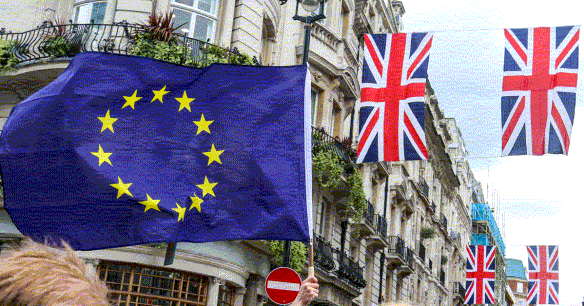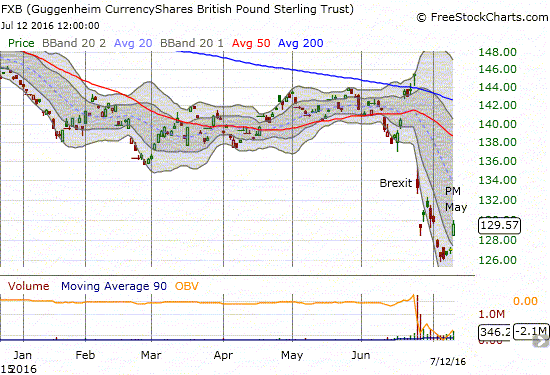Brexit – It was “the vote heard ‘round the world”, as many have called it, but if you were in the financial markets, you either won big or took one for the team. The bloodshed was reminiscent of last year’s currency fiasco when the Swiss National Bank removed the Euro peg on the Swiss Franc, but in this case, brokers were not the big losers – Investors were. As one reporter put it, “The Brexit vote shocked investors and triggered $2 trillion in losses in global stock markets the day after the referendum.”
Pound Sterling fell nearly 15% before recovering a bit. It now hovers around 1.33 versus the U.S. Dollar. The FTSE 100 fell, as well, but a “dead-cat bounce” brought the index back above previous valuations. Global financial markets, however, were in turmoil. When uncertainty is pervasive, capital is quick to move to safe havens, like Gold and U.S. Treasuries, to ride out the storm.
It has now been three weeks since British voters told Europe to take a hike. The dust has now begun to settle. A tsunami of new articles in the financial press is speaking to the pros and cons of the event, but no one knows for sure what will happen once the hangover wears off. The only certainty is that market volatility will remain for a period of time, anywhere from weeks, to months, and even years. The impacts, however, will not be confined to the UK or the EU. Global trade will feel the disruptions across the planet. Dramatic changes in currency valuations have a way of rippling through every consumer household on earth in everyday costs for basic things like food, energy, clothing, entertainment, and whatever other consumable there is.

What happened, why, and where are we now?
British voters, after months of acrimonious debates, decided by a small margin, some 52% versus 48%, to leave the EU. As has been reported, this vote is not legally binding. Parliament may still have to give its consent, but David Cameron has stepped down as Prime Minister. Theresa May has ascended to stardom to fill his shoes, proclaiming that, “Brexit means Brexit”, whatever that phrase may mean. Amidst the chaos, many British citizens are now having regrets, or “Regrexit”, if you prefer the new buzz-word. Scotland, Wales and Northern Ireland may also begin their own “UK-exit” campaigns, since their citizens voted by over 60% to remain in the EU. The UK is more divided now than ever.
There have also been a number of legal maneuvers initiated to reverse the referendum’s outcome, but the jury will be out on these efforts for quite a while. The European Union is not rejoicing either. Article 50 of its constitution, the one stipulating how a member is to leave if it chooses to do so, has never been invoked. We are in uncharted territory, but populist movements in other countries have already gained momentum. We may soon have new additions to our lexicon, including such anagrams as Frexit, Spexit, NExit, Grexit, Italxit, or even Hungexit, to cite a few already in the press.
The Brexit outcome may have come as a surprise to the establishment, but the reasons why have been percolating for the past fifty years, a result of the damaging impacts on developed countries of decades of outsourcing and off-shoring and of technology enabling the greatest shift in wealth across the planet in all of humanity. Developed countries are struggling. Middle classes are being devastated. Wealth is becoming more and more concentrated at the top of the pyramid.
There is one positive result. Poverty across the globe has come down from 30% of households to 10%, according to published reports by international agencies that compile such data, but these improvements in global standards of living have come at the expense of citizens in developed economies. There is a seething current of anger below the surface that only needs a bit of prompting to breath fire into the body politic. The anger, unfortunately, is directed at politicians and at immigrants that are willing to work for low wages to get ahead.
The Brexit result has already been attributed to issues surrounding jobs and immigration, a theme also being heard across Europe and North America, as well. Opportunistic politicians know how to stir this populace pot, as one pundit quipped, “No doubt, the decision by British voters to leave the European Union opens up some uncertainties about the future, some of which will be around for some time. But much of the fear mongering ahead of the vote was nonsense on stilts. Judging by the frenetic reaction of the political elite and the markets, you would think Armageddon was upon us.”
The intensity of the situation, however, has subsided. You may still Google “Brexit” and receive over 60 million items, but Google trend charts reflect an anxiety bubble that has been quickly deflated. Sentiment may have calmed down, but the near-term impacts are beginning to reveal themselves:
- The Pound and the Euro have taken a beating. If you were dreaming of a vacation or holiday in the UK or continental Europe, now would be a good time to go. If you are an expat being paid in USD, then you just received a tidy little raise;
- As the U.S. Dollar strengthens and global growth is stymied by uncertainty in Europe, oil prices should fall as a result, or at least stay below $50 a barrel;
- Central banks will not be raising interest rates anytime soon, such that mortgage rates should remain low for a while longer. Housing prices may also fall, as investment capital waits for a clearer picture of the future;
- The shift in capital to safe havens is lowering bond yields and returns on fixed-income securities;
- Banking sector stocks have taken a beating, due to fears over lower earnings and increasing defaults related to falling housing prices;
- Multinational corporations will take an earnings hit due to unforeseen currency devaluations. All eyes will be on earnings and statements about the future. Yes, companies can hedge their risks, but only for a distinct period of time.
- One of the cruelest lessons of Brexit is that managing currency risk is not an easy task. Portfolio diversification as a protection can fail, as well, when a system wide event wreaks havoc on all existing positions.
These impacts are just the beginning. As one analyst opined, “None of us really knows the magnitude, and I doubt there will be a moment when people say Brexit is done. There is a good bit of uncertainty.” And so, volatility will continue to plague markets and offer trading opportunities to the fleet of foot. The net result, however, is that a subset of doomsayers are coming out in force, reinforcing their forecasts for a global recession in 2017 or even sooner, if you are willing to believe their newsletters.
What fundamental scenario will dictate future movements in the “GBP/USD”?
Financial markets are settling into new ranges, and a consensus is already forming related to Pound Sterling for the road ahead. Here is a brief summary of its salient points:
- The Bank of England will more than likely reduce interest rates and expand quantitative easing, thereby diluting the value of the Pound;
- Loss of business confidence and the exit of investment capital will pull the UK into a recession before the end of 2016;
- The UK’s capital account deficit will grow by leaps and bounds and put more pressure on the Pound, as imports outweigh exports of lower valuations;
- Investments in UK commercial ventures are already receding. Property hedge funds are witnessing redemptions that harken back to the Great Recession. Without an influx of investment capital, the Pound must fall to lower levels.
The Pound lurks at 1.33, but how much lower could it go? The lowest the Pound has ever been was in 1985, when it hit 1.05, but only for a brief period of time. From a history perspective, the Pound has always recovered from brief bouts of hysteria, but will history repeat itself or are we in a new and unpredictable situation? Surveys of economists point to 1.20 as a bottom floor, but several more see parity with the greenback as a distinct possibility.
How should a trader play the Pound under these Post-Brexit conditions?
One of the well-known supporters for the parity scenario is Mohamed El-Erian, chief economic adviser for the Allianz investment company. In a recent interview, he remarked that, “The future value of sterling is a function of how quickly the structural uncertainty is resolved – if plan B is delayed and/or it doesn’t involve much of a free trade setup with the EU, it is not inconceivable for sterling to head to parity with the US dollar.”
In other words, once the present desire to invalidate the Brexit vote dissipates and the negotiation with the EU begins, the path to a new “Plan B” of operating will stir the market with each rumor of success or failure. The Pound will be susceptible to wild swings, as was experienced when the new PM was announced (see chart below):
The market is reacting as it normally does when “event” risk causes a major disruption. The heat of emotion always drives the bar well beyond its logical new equilibrium point, giving the trader an excellent opportunity to make money going both ways – going short when the pressure mounts, then going long for the inevitable bounce back. Contrarian investors are already buying Pound Sterling on a long-term basis. They will be rewarded when positive news hits the media, but the long-term play, if the experts are correct, will favor a shorting strategy. Timing will be everything, but opportunities will abound.
Concluding Remarks
The aftermath of the Brexit referendum, whether we like it or not, will be with us for some time to come. No one yet has a credible fix on what the full impacts of the outcome will be or how financial markets will adapt to this tumultuous event over time. Lack of true knowledge, however, has never prevented the unqualified from predicting the future. Be careful of the counsel you keep. There will be many false prophets out there.
Although there will be uncertainty, there will also be volatility, and, with volatility, there will always be opportunities in our foreign exchange markets. The next few months will bring a fair share of predictable swings in market activity, and then the presidential race in the U.S. will build toward its November crescendo. Be wise, but be cautious!

 Between 74-89% of CFD traders lose
Between 74-89% of CFD traders lose  Your capital is at risk
Your capital is at risk  Your capital is at risk
Your capital is at risk  Your capital is at risk
Your capital is at risk